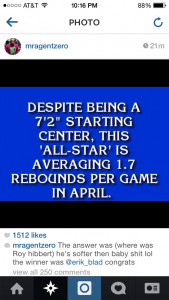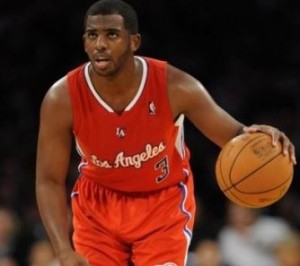 The first round of the 2014 playoffs has been remarkable for the many crazy story lines and the record number of both games and Game 7s. Usually the first round is a snoozer with two or three sweeps, and the only upsets are the No. 5 over No. 4 variety.
The first round of the 2014 playoffs has been remarkable for the many crazy story lines and the record number of both games and Game 7s. Usually the first round is a snoozer with two or three sweeps, and the only upsets are the No. 5 over No. 4 variety.
But this year gave us so many thrills that we all got to witness so much more. We have all experienced great regular season games that have been played with “playoff intensity.”
Do players actually try harder in the playoffs? And does that mean that they coast during the regular season and phone it in?
Actually no, but they do concentrate more in the playoffs.
The playoffs are remarkable in so many ways because of the series format. What does it really take to win a seven-game series? Doesn’t the best team always win? How do you upset a team four times? It doesn’t seem possible.
The key to winning playoff games is matchups. When you play the same team over and over, it is crucial to exploit every possible weakness in your opponent. The team strategies get old fast. Both teams know each other’s plays, tendencies and habits. There are no surprises. The biggest elements that can be changed are the matchups.
In the regular season, teams strive to build consistency by having a regular rotation so the players know how many minutes, touches and shots they can expect. Many players know down to the minute when they are coming out or going in. For instance, players often will be set up to sub in after the three-minute timeout in the first quarter and play through the six-minute timeout in the second period. They get mentally ready to go in and get their stretching done.
Rarely will these rotations change unless something unexpected happens, like an injury or foul trouble. Most teams have a couple of math geeks tracking it all and analyzing player performance minute by minute in different combinations, trying to figure out the best rotations over the long term. Remember, the ideal is to get your rotations fixed for the long haul to maximize efficiency. No player wants to go into a game wondering if he will play 12 minutes or 30 minutes. He wants the confidence to know that he will get time to get into a rhythm and not get yo-yo’d.
In the playoffs, all that goes out the window. Since you are playing the same team over and over, the general tendencies of multiple teams are of no interest. You only care about what one specific team does. History is full of examples of a team that can beat most of the other teams easily but one particular team “has their number.”
 In these playoffs, Pacers center Roy Hibbert had been a complete no-show until his 28-point outburst Wednesday night in Game 2 against Washington. How is it that an All-Star player can put up donuts in the playoffs when his production is needed more than ever? Did he forget how to play? Were the 82 games of the regular season a fluke?
In these playoffs, Pacers center Roy Hibbert had been a complete no-show until his 28-point outburst Wednesday night in Game 2 against Washington. How is it that an All-Star player can put up donuts in the playoffs when his production is needed more than ever? Did he forget how to play? Were the 82 games of the regular season a fluke?
In Hibbert’s case, he was marginalized by the Atlanta Hawks playing without star center Al Horford, who went down with an injury in January. The Hawks were forced to go with a small lineup and gave the Pacers fits. The lineup forced Hibbert – at 7-2 an effective player around the basket – to defend on the perimeter against a smaller player, making him a major liability.
Hibbert became next to useless, hurt his team when he was on the floor and eventually had to be removed from the lineup. Why? Bad matchup. In a series, you have to solve this team before you can go on to the next one. So not only did the top-seeded Pacers barely beat a team it should have dominated, the Hawks found the formula to neutralize an All-Star player. Now the Wizards know to use their bigs away from the basket to neutralize Hibbert.
Unless the Pacers find a solution and make an adjustment that sticks, you might as well write off Hibbert because every team will hammer away at that matchup. Game 2 will go down as an aberration rather than a resurrection.
So it begs the question, what are some adjustments that you can make to solve these types of problems? What types of matchups make a real difference?
1. Don’t let one guy beat you. Also known as solving the Thunder. Kevin Durant carried the team in the regular season as the league’s leading scorer, but history shows that you can’t win a championship that way. Many teams will decide to shut down the other scorers and let Durant get his 30 or 40 but won’t let the role players get going by double-teaming him heavily. They will assign two or three guys to take turns guarding Durant and harass him all over the floor. This usually works in the long run if you can maintain discipline and clog the driving lanes.
 2. Pick-and-roll you to death. This brings us to the Clippers. Chris Paul struggled some in the Golden State series because he had to pay so much attention to the Splash Brothers that offense was rest time. Against the Thunder, he had no such issues and went crazy on the offensive end (even for him) in Game 1. The Clippers set a lot of screens, Blake Griffin had a field day and DeAndre Jordan roamed freely. Look for the Clippers to keep at it until the Thunder find an answer. The reason that the pick-and-roll is the most popular play is because it works. Always. Just ask John Stockton and Karl Malone.
2. Pick-and-roll you to death. This brings us to the Clippers. Chris Paul struggled some in the Golden State series because he had to pay so much attention to the Splash Brothers that offense was rest time. Against the Thunder, he had no such issues and went crazy on the offensive end (even for him) in Game 1. The Clippers set a lot of screens, Blake Griffin had a field day and DeAndre Jordan roamed freely. Look for the Clippers to keep at it until the Thunder find an answer. The reason that the pick-and-roll is the most popular play is because it works. Always. Just ask John Stockton and Karl Malone.
3. Hammer you inside. For the Washington Wizards, with Marcin Gortat and Nene being big mobile centers that run the floor, pass well and shoot it from 17 feet, the Pacers have a problem. If Hibbert is limited by matchup problems, then the Wizards will use his non-presence to move inside and pound away in the low post. Indiana’s issue is that Washington’s bigs are versatile enough to face up Hibbert when he is in the game or go high-low on David West with their tandem when Hibbert is on the bench.
4. Be the more disciplined team. This calls to mind the San Antonio Spurs. When you watch the Spurs play, you tend to have old school flashbacks. They execute their plays, make the extra pass and knock down open shots on offense and clog the middle on defense. They get you frustrated and are tough to come back on when they get a lead. There are no back-to-back games, so age and fatigue isn’t a factor. They are tough to beat in a series because they understand that winning is a skill that is as important as shooting.
5. They are better than you. Ah, the Miami Heat. This is a tough matchup because when push comes to shove, they have the best player in LeBron James. They can usually get a basket when they need one, make a three when necessary and are proven winners. Beating them four times in two weeks hasn’t been done in almost three years, so good luck.
Over the course of a series, good teams typically can adjust well enough to stop the go-to moves of their opponent. After all, you will be forced to practice against it over and over. Remember that everything works until it doesn’t. Then you try something else.
Often the series will come down to an X factor. Either an unusual matchup will be exposed, putting a fresh face in the spotlight, or an injury will give someone an opportunity to step up.
By Game 5 both teams have run out of new moves to make, so the games get uglier and sheer heart takes over. Basketball players need to make basketball plays. The coaches have run out of things to say and time slows down.
The saying, “Sports doesn’t build character, it exposes it” is never more on display than in a seven-game series. By the end, it is like the final round of a heavyweight fight. What’s left is two foes digging deep and being challenged in a consuming way.
It’s called the “Second Season” for a reason. Going all the way through the playoffs is like playing an entire other season. Two months of playoff intensity will just wear you out.
I love it!
Danny Schayes is a retired 18-year-veteran of the NBA, a professional broadcaster and soon-to-be-published author now penning NBA columns for SheridanHoops. Follow him on Twitter.
MORE FROM DANNY SCHAYES:
DONALD STERLING IS A SCHMUCK, BUT WE ALREADY KNEW THAT
WHAT PLAYERS CAN LEARN FROM DONALD STERLING
HOW PLAYERS HANDLE THE UPS AND DOWNS OF A PLAYOFF SERIES
UNION’S SEARCH FOR A NEW EXECUTIVE DIRECTOR; PART II
RAISING AGE LIMIT TO 21 IS A BAD IDEA, AND SOMEBODY SHOULD SAY SO
BASKETBALL VS. MARKETING: IS THE TAIL WAGGING THE DOG?
WHERE IS THE LOVE? SAG LAWYER AMONG CANDIDATES TO REPLACE HUNTER
ARE NBA PLAYERS GETTING PLAYED AGAIN AS UNION HUNTS FOR NEW CHIEF?